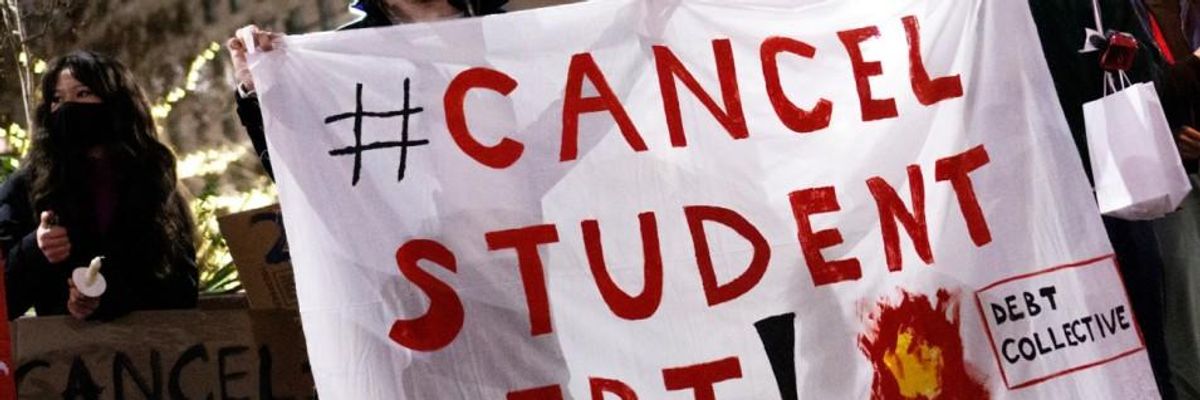President Joe Biden is facing backlash from civil rights groups and progressive activists for excluding federal student debt cancellation from a new slate of proposals aimed at reducing the racial wealth gap, with the NAACP warning that the omission undercuts the White House's stated goal of tackling long-standing inequities.
Noting that student loan debt "disproportionately affects African Americans," NAACP president Derrick Johnson told the Washington Post Tuesday that "you cannot begin to address the racial wealth gap without addressing the student loan debt crisis." One recent study estimated that Black students start with around $7,400 more in debt than white students--a gap that widens to $25,000 four years after graduation.
"The president can cancel student debt with the flick of a pen, and by doing so would drastically narrow the racial wealth gap for Black Americans. We know this. The NAACP knows this. So when will Biden do it?"
--The Debt Collective
Unveiled just ahead of his Tuesday trip to Tulsa, Oklahoma to commemorate the centennial of the racist massacre of 1921, Biden's raft of policy proposals calls for boosting federal support for small businesses in underserved communities and strengthening the Fair Housing Act to support Black homeownership, among other measures.
But Johnson warned that "until we address the student loan debt crisis... we can never get to the question of homeownership, therefore accumulating wealth."
The Debt Collective--a coalition that is urging Biden to use his executive authority to cancel all $1.8 trillion in federal student loan debt--echoed the NAACP's critique of the president's proposal, declaring, "We want actions along with words."
"The president can cancel student debt with the flick of a pen, and by doing so would drastically narrow the racial wealth gap for Black Americans," the group added. "We know this. The NAACP knows this. So when will Biden do it?"
When asked during a Tuesday briefing why student debt cancellation was not among the new proposals and whether Biden is still considering such relief, Principal Deputy Press Secretary Karine Jean-Pierre dodged the questions, pointing to the president's push for "$46 billion of investments in [historically Black colleges and universities], Tribal colleges and universities, and minority-serving institutions."
"And so, President Biden is calling for a historic investment in affordability through subsidized tuition and expanding institutional and--grants," Jean-Pierre added.
At the beginning of April, White House Chief of Staff Ron Klain announced that Biden had directed the Education Department to prepare a memo on the president's legal authority to unilaterally cancel student loan debt.
But nearly two months later, the memo has yet to be completed, sparking frustration among activists who believe the Biden administration is dragging its feet on the key issue.
"It's taking too long," Braxton Brewington, a spokesperson for The Debt Collective, said of the memo in an interview with NBC News over the weekend. "We believe that it is a stall tactic."
Biden has previously endorsed canceling $10,000 in student loan debt per person through legislation, dismissing calls from progressive lawmakers and Senate Majority Leader Chuck Schumer (D-N.Y.) to cancel at least $50,000 per borrower.
"I will not make that happen," the president declared during a February town hall in response to a question from an attendee who said student loan debt is "crushing" her family, friends, and millions of others across the U.S.
According to a Brookings Institution study released earlier this year, student debt forgiveness of $10,000 per borrower "would be wide in scope but a thin amount compared to the average debt held by most students, particularly Black students."
"The Biden plan would have significant impact for many families... but it would not have the ameliorative racial wealth effects that larger cancellation policies would have," the study's authors noted, pointing out that Sen. Bernie Sanders' (I-Vt.) campaign-trail proposal to wipe out all federal student loan debt would have the biggest impact.
"As might be expected," the authors wrote, "we find that the more student debt that is canceled, the greater the effect increasing Black wealth, particularly for households below the wealth median."

